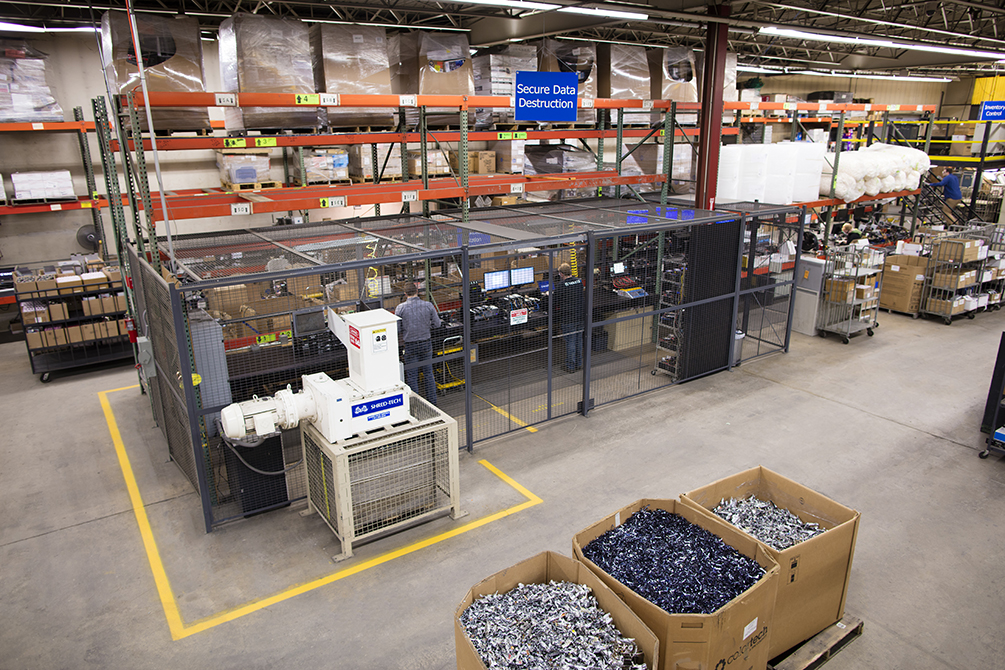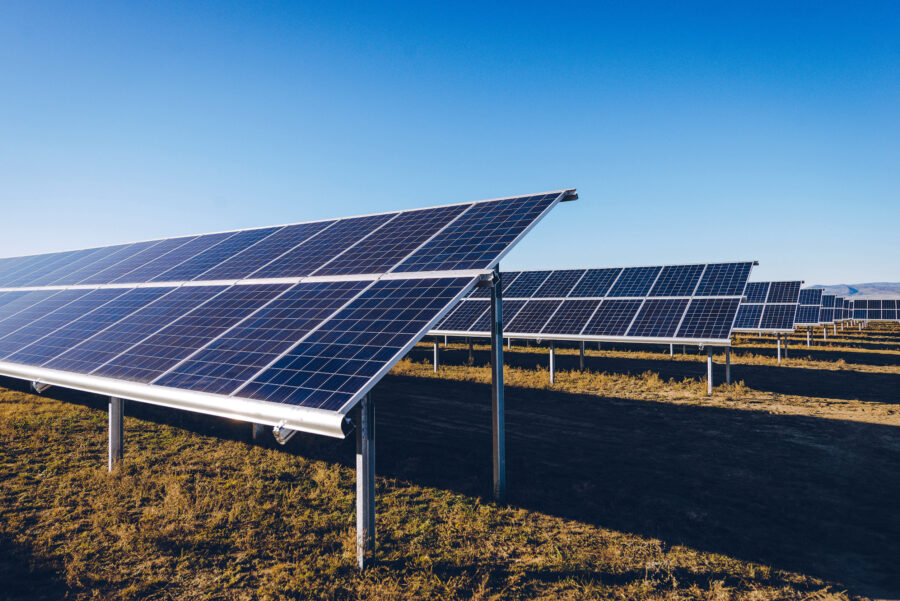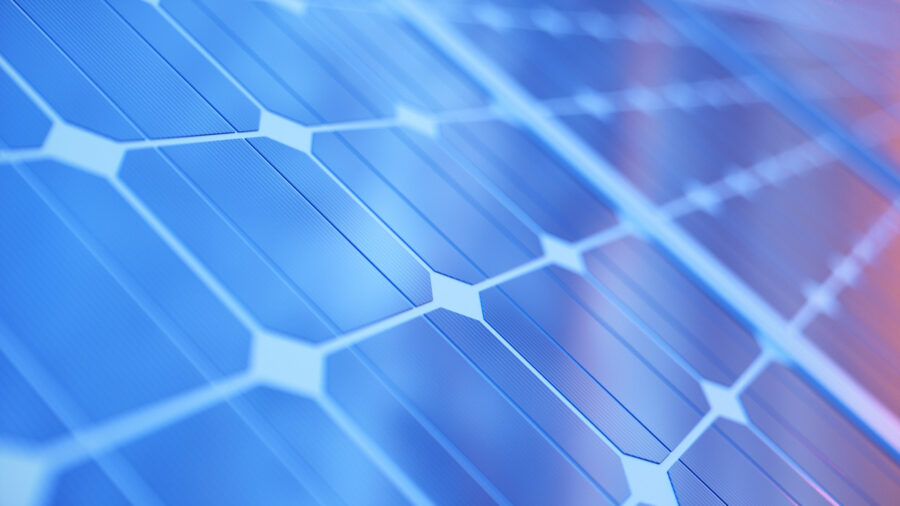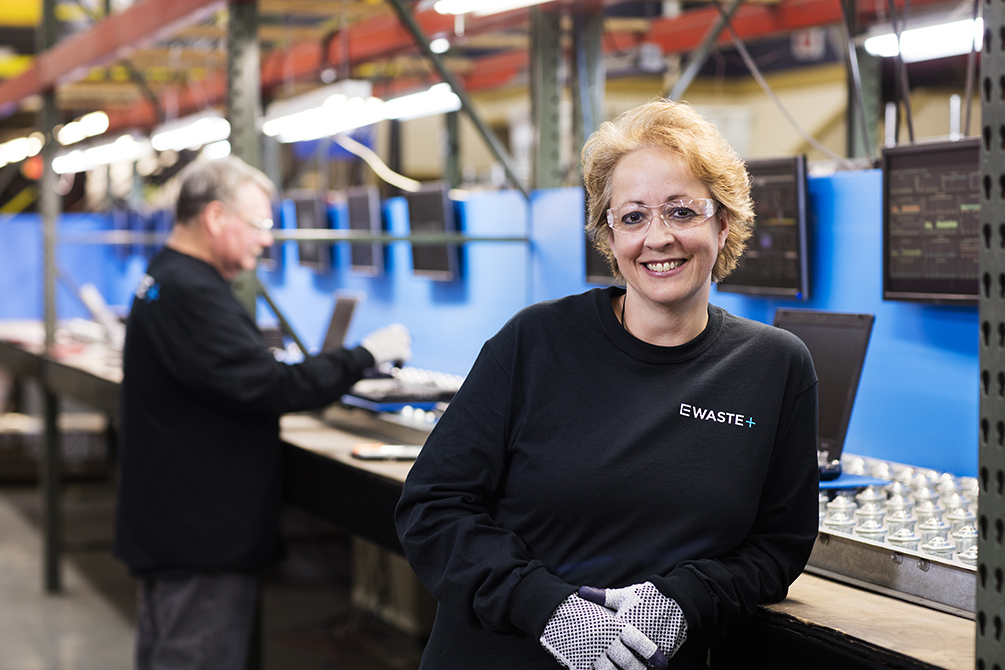
EWASTE+ Your Leader in Solar Panel Recycling
Solar panels often contain small amounts of metals and other substances that may be toxic to humans, such as lead and mercury. The presence of these substances means that anyone handling a solar panel should be certified and knowledgeable about how to do so safely while minimizing exposure to these substances. This is also a common reason why many people are seeking alternative solutions to disposing of panels, instead of allowing them to go to the landfill where those toxic materials can then spread into the environment.
Solar Panel Disposal Processes
Solar panel recycling may take different forms depending on the type of solar panel that is being recycled.
In most cases, the frame and junction box are removed first. Unsealing and disassembling the glass is often the most difficult part that requires specialized equipment. High temperatures are typically required to loosen the adhesive, as the panels are designed to withstand 20-25 years’ worth of high-intensity sunlight.
Solar panels may contain small amounts of hazardous metals and materials that pose risks to recycling plant employees and require careful handling. The removal of these materials is crucial before the basic components can be processed further through milling, crushing, or shredding for use in other manufacturing processes.
This recycling process is relatively new to the industry. It has gained importance as panels installed in the early 2000s begin to reach the end of their life and require disposal. Ongoing research and development are enhancing the methods used to reclaim materials efficiently, although these processes are not yet widespread.
Why Work with a Scrap PV Solar Panel Modules Processing Facility?
Working with a processing facility provides you with more options that you can rely on for quick processing times, confidentiality, and safe electronics handling. Even though solar panels do not appear to be strictly electronic waste, they do generate and store electricity, and are considered electronics, which is strictly tracked as a type of waste product.

Types of Solar Panels
There are four main types of solar panels that are on the market today and are able to be recycled. These four types of solar panels include monocrystalline solar panels, polycrystalline solar panels, passivated emitter and rear cell (PERC) panels, and thin-film solar panels.
Monocrystalline Solar Panels
Monocrystalline solar panels are made from a single silicon crystal that is then cut into several wafers to provide the silicon layer. Since these panels are made of pure silicone, they are dark black in color and tend to last the longest with the best space efficiency on the market today. Unfortunately, these panels are also costly, as a lot of silicone is wasted to create a single cell.
Polycrystalline Solar Panels
Polycrystalline cells, as the name suggests, come from different silicone crystals instead of a single one. The fragments of silicon crystals are poured into a square mold after being liquified. While there is less waste and comes at a more affordable cost than pure silicon cells, their silicone purity is lower. This means that they’re less efficient and have a lower heat tolerance than other types of cells.
PERC Solar Panels
PERC panels, or passivated emitter and rear cell panels, are a newer type of panel that is relatively new to the market. This technology adds passivator layers to the construction, sending waves of light bouncing throughout the panel as it continues to generate heat and energy, absorbing a higher wavelength and protecting the back sheet from heat, creating a highly efficient system.
Thin-film Polar Panels
Thin-film solar panels are flexible panels that do not require frame backings, making them a lightweight panel option that is easy to install. These panels, however, tend to be less efficient, as they do not utilize silicon for solar absorption.
The Three Main Types of Silicone Cells
The three main types of silicone cells are considered amorphous, monocrystalline, and polycrystalline. We discussed earlier that polycrystalline silicone is melted and shaped, but has significant impurities, while a monocrystalline silicone cell is cut from a single piece of silicone, but creates a lot of costly waste in the process. Amorphous silicone cells, however, are flexible silicone cells that are easily shaped and can be attached to almost any surface, providing opportunities for small, lightweight solar panels in consumer-grade items.

Solar Panel Recycling FAQ
Understanding the Recycling Process for Solar Panels
What Happens to Old PV Panels?
Currently, old PV panels, also known as solar panels, are often disposed of in landfills. This is problematic because these panels contain toxic materials such as lead and mercury, making landfill disposal environmentally hazardous. It is considered regulated waste, and currently, there are limited widespread options for recycling these materials. However, this lack of options presents a significant opportunity for recycling initiatives, as the materials used in solar panel manufacturing are finite and valuable environmental resources.
The most common approach for homeowners, businesses, and manufacturers is to engage with an electronics waste company like EWASTE+ to dismantle the panels. This process allows for the responsible handling of these materials. As more comprehensive recycling options become available, it enables a broader range of stakeholders, including commercial customers, to actively participate in addressing the environmental challenges posed by the disposal of solar panels as solar energy becomes an increasingly viable option.
What Part of a Solar Panel Can be Recycled?
Depending on how the solar panel was made, different parts of the component can be recycled. Not every solar panel is made equally, and solar panels may degrade at different rates depending on the materials used and in which combinations they are manufactured in. Because of that, this also changes how much of a solar panel can be recycled.
Typically, unbroken glass, copper wire, aluminum, plastic, and other materials can be recycled easily. Glass is likely to be the most common material that will be removed from a solar panel, while about 25% of the remaining component is comprised of other materials such as wiring, plastic, and metal.
What Happens When a Solar Panel is Recycled?
When a solar panel is recycled, it’s important that the glass, silicon, metal, and plastic are all separated. Since these materials can’t typically be recycled together in the same facility, the separation ensures that they are each directed to the appropriate facilities to be safely broken down into their raw components for re-use.
This is a specialized process, as solar panel recycling is a new industry as homeowners and manufacturers are only beginning to think about how panels from the early 2000s are treated at the end of their product cycle. This is particularly important when the materials for creating new panels are finite, and not as easily accessible as they were twenty years ago.
How Are Solar Panels Made and Broken Down?
Solar panels are typically made in layers and wedges with thin films of adhesive and chemical treatments, all wired together. When sunlight hits these panels, it generates heat, which generates electricity. Certain layers of the solar panel take that generated electricity and store it in an internal or external battery for later use.
When panels are broken down, the process must be reversed with care. Not only are several items adhered with the intention of the panel withstanding contact with direct sunlight for many years, but the adhesive can fuse with the materials used in the panel. Once separated, the panel can be broken down into its individual parts and recycled effectively with traditional recycling machines.
Where to Find a Scrap PV Solar Panel Processing Facility?
While scrap PV solar panel processing facilities are not commonly available, you can look for one by calling local recycling plants and asking if they can recycle these materials, or if they know of nearby plants that can. Some commercial services also offer recycling services, but this can be costly and difficult to track. With EWASTE+, we specialize in recycling for your panels and can pick up the panels from your place of business before bringing it to our warehouse for processing.
Why Choose a Certified Recycler?
Particularly when dealing with solar panels, it’s essential to choose a recycling service that is in compliance with environmental regulations associated with handling electronic waste. EWASTE+ is R2v3 certified to handle these components, including solar panels, while providing a traceable path of custody that complies with all environmental regulations.
R2v3 certification is the latest version of the Responsible Recycling (R2) standard, designed specifically for electronics recyclers to ensure environmental responsibility and the health and safety of workers handling e-waste. This certification demonstrates that EWASTE+ adheres to the highest industry standards for managing used electronics, focusing on sustainable recycling practices and thorough data destruction processes. By choosing an R2v3 certified recycler like EWASTE+, customers can be confident that their electronic waste is managed in an environmentally safe and secure manner.
EWASTE+ Is Your Partner in Compliant and Secure Disposal
With the significant growth in demand for solar energy in recent years, there’s no denying that the value of recycling the resources from old or dead panels that were installed years ago. With few options available, however, many manufacturers and homeowners are turning to compliant electronic waste and recycling companies to process the materials into separate components before being sent to a proper recycling plant that can continue processing the individual materials.
EWASTE+ is the top choice for the northeastern US, with mobile units available for pick-up and secure, certified handling processes. We are here for you, ready to help you take the next step in the solar panel recycling process. Get in touch today to learn more about our process and see how we can help you recycle your solar panels on a one-time or recurring schedule.


